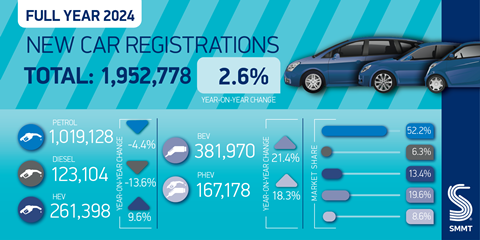
Electric vehicles made up 19.6% of UK new car sales in 2024 – up by more than a fifth on the year before. However, lacklustre demand from private buyers meant that the figure fell short of the 22% share demanded by the government mandate.
In what was the first year of car manufacturer targets to sell zero emission vehicles (ZEV), SMMT figures show a strong performance in EVs for December. There were 43,656 EV registrations in the last month of the year accounting for 31.0% of the market – the highest since December 2022’s record 32.9%.
The SMMT says that the industry has “pulled every lever” to try to achieve the mandate’s target, with manufacturer discounting totalling more than £4.5 billion in 2024, but it warns this amount is not sustainable in the long-term.
Also it says billions of pounds of investment in new technologies and products over the past decade have delivered a record 132 ZEV models to the UK market, up 38% since 2023 to account for a third of all models available.
One of the major constraints to growth has been sluggish demand from private buyers, with only one in 10 choosing an EV in 2024. Petrol remained the most popular powertrain among these buyers, representing 61% of demand, with hybrid electric vehicles (HEVs) in second place (16.0%). Conversely, around 64,000 more EVs were registered by businesses and fleets compared with a year ago, says the SMMT, representing a quarter (25.4%) of those segments’ registrations and demonstrating the effectiveness of the compelling tax incentives afforded non-private buyers.
Across the total market, pure petrol and diesel car registrations fell by -4.4% and -13.6% respectively as more buyers swapped either to electric vehicles, or to lower emission hybrid electric vehicles (up 9.6%) and plug-in hybrids (up 18.3%).
The SMMT warns that meeting the mandate thresholds in 2025 will be even more intense as the target is now 28%. The government is consulting on its ZEV mandate, amid concerns from manufacturers that the targets are unrealistic.
It says that the government must do more to stimulate private demand and challenge chargepoint operators to accelerate rollout, ensuring the UK has a reliable, affordable and comprehensive nationwide network of infrastructure that dispels any doubts potential EV buyers may have to make the switch.
Mike Hawes, SMMT chief executive says: “We need rapid results from the regulatory review and urgent substantive support for consumers – else automotive investments will be at risk and the jobs, economic growth and net zero ambitions we all share in jeopardy.”
Sue Robinson, chief executive of the National Franchised Dealers Association (NFDA) which represents franchised car and commercial vehicle retailers in the UK, says that the organisation has written to Business Secretary Jonathan Reynolds MP suggesting several policy recommendations to make the ZEV mandate workable.
“As we look ahead to 2025, it is vital for the government to work closely with the NFDA and the broader industry to ensure the ZEV mandate bolsters rather than disrupts the sector,” says Robinson. “Additionally, key developments to watch over the course of the year include the introduction of VED on electric vehicles and the rise in employer national insurance contributions.”
































